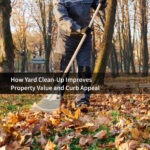What You Need To Know About Lawn Care Fertilizer

Lawn Care Lethbridge brings pride to any homeowner through a beautiful, lush lawn. It improves curb appeal, provides space for outdoor activities, and creates a neat, vibrant environment around your home.
Appropriate fertilizer is one of the key elements in obtaining and preserving a lovely grass.
Knowing where to start, though, can be scary given the abundance of lawn care fertilizer products presently on the market. From the basics to selecting the correct type for your particular needs, this course will dissect your knowledge about lawn fertilizer.
This comprehensive guide will be your go-to tool regardless of your level of experience gardening or search for professional lawn services Lethbridge.
Why Should You Fertilize Your Lawn?
Like other plants, grass needs nutrients if it is to flourish. Mowing, variations in temperature, and consistent use over time can cause nutrient depletion in the ground. Stronger roots, greener blades, and improved resilience to pests and diseases follow from fertilizers helping to restore these vital nutrients.
Regular fertilizing also enables your grass to recover from stress brought on by drought, heat, or heavy foot activity. Researching lawn care Lethbridge will quickly teach you that timing and technique are just as important as the product itself.
Three Main Ingredients in Lawn Fertilizer
Usually displaying a three-number code like 20-10-10, most lawn fertilizer packaging displays the amount of three essential nutrients:
- Nitrogen (N) : promotes lush green color and fast development.
- P, phosphorous, encourages robust root development.
- Potassium (K) increases cold weather, drought, and disease resistance.
Depending on its type, age, and local soil condition, every lawn could need a different nutritional balance. If you routinely use a lawn mower in Lethbridge, you could find that wear and tear on your grass affects it. This is where a balanced fertilizer helps restore your lawn.
Various Kinds of Lawn Fertilizers
Fertilizers come mostly in two types:
- Artificial Fertilizers
Synthetic fertilizers created chemically and working quickly provide nutrients straight to your lawn. Careful measurement and timing are therefore crucial since overapplication can cause nutrient runoff or grass burn.
- Sustainable Fertilizers
Made from organic sources including manure, bone meal, or compost, these fertilizers release nutrients slowly. They also boost microbial life and change the structure of soil. For environmentally aware homeowners or those looking for sustainable lawn services in Lethbridge, they are perfect even if they require more time to show benefits.
Granular Vs Liquid fertilizers
Furthermore crucial is the type of fertilizer used:
Granular Fertilizers
Available in pellet or grain form, a broadcast or drop spreader uniformly distributes them. Their formulations are both quick- and slow-release.
Liquid Fertilizers:
Liquid fertilizers operate rapidly and are perfect for rapid results, particularly in the growing season; sprayed onto the lawn using hose-end or pump sprayers.
Which Should You Select?
- For long-term care, choose finely ground slow-release fertilizer.
- When your grass needs a quick nutrient boost, choose liquid fertilizer.
- Many experts in lawn care Lethbridge provide both kinds as part of seasonal maintenance programs.
When Should You Feed Your Lawn?
Lawn fertilizer’s timing is everything. Fertilizer applied at the incorrect time may cause damage or poor results.
Regarding cool-season grasses—Kentucky bluegrass, fescue, ryegrass:
- Early spring encourages early development and healing following winter.
- Late spring through early summer develops robust roots.
- Fall: Most important period—stores energy to ready grass for winter.
- For warm-season grasses (bermuda, zoysia, st. Augustine):
- Late Spring: As grass starts to grow
- Summer improves color and supports maximum development.
- Early fall lets the grass wind down without encouraging too rapid development.
Typical Mistakes Made with Lawn Fertilizer
- Over Fertilizing can cause chemical burns or too much thatch.
- Fertilizing causes poor development and yellowing.
- Fertilizing in dormancy or during heat waves might damage your lawn.
- Not every grass calls for the same nutrient mix based on N-P-K balance.
- Ignoring product instructions: Always apply according to the advised rate and schedule.
Especially when dealing with Lethbridge lawn care experts, avoiding these blunders will save time, money, and aggravation.
Eco-Friendly Lawn Fertilizer Tips
Should you want to lower your environmental impact:
- To naturally replenish the ground, choose compost or organic fertilizers.
- Slow-release formulations help to reduce fertilizer runoff.
- Steer clear of fertilizing just before heavy rain to stop leaching.
- Grass clippings left on the lawn help to organically replenish nutrients.
- These environmentally friendly methods not only help soil quality but also fit the eco-aware lawn care regimen used by many in Lethbridge.
Thoughts on Final Notes
FAQs
Fertilizing replenishes essential nutrients, strengthens roots, makes grass greener, and improves resistance to pests, drought, and diseases. It also helps lawns recover from stress caused by mowing, heat, or heavy foot traffic.
Most lawn fertilizers contain Nitrogen (N) for green growth, Phosphorus (P) for strong root development, and Potassium (K) for resistance against drought, cold, and diseases.
Synthetic fertilizers deliver quick nutrients but must be applied carefully to avoid burns or runoff. Organic fertilizers, made from natural sources like compost or manure, release nutrients slowly, improve soil health, and support microbial life.
Granular fertilizers are great for long-term feeding and can be slow- or quick-release. Liquid fertilizers act quickly and are ideal when your lawn needs an immediate nutrient boost, especially during the growing season.
For cool-season grasses (like fescue, ryegrass, or bluegrass), fertilize in early spring, late spring, and fall. For warm-season grasses (like Bermuda, zoysia, or St. Augustine), fertilize in late spring, summer, and early fall.
Common mistakes include over-fertilizing (causing burns), under-fertilizing (causing poor growth), applying during dormancy or heat waves, ignoring nutrient balance, and not following product instructions.
Use organic fertilizers or compost, choose slow-release products to reduce runoff, avoid applying before heavy rain, and leave grass clippings on the lawn to naturally recycle nutrients.


